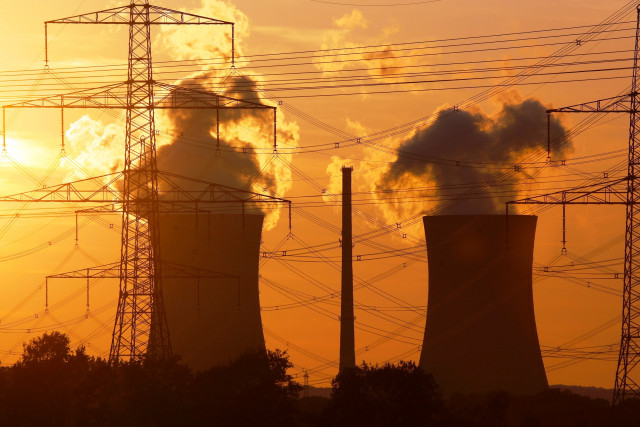PAEC defends proposed expansion of KANUPP
Contends petition not maintainable, should be dismissed with ‘exemplary costs’

Nuclear power plants. PHOTO: EPA/ FILE
The reply was submitted in a case filed by the Public Interest Law Association of Pakistan and others against the existing operations and proposed expansion of the Karachi Nuclear Power Complex (KANUPP).
SC concerned over N-power plants near populated areas
The PAEC also stated that it has started work on the nuclear power project (KANUPP) after thorough site studies and fulfilling the requirements of national laws framed by the Pakistan Nuclear Regularity Authority (PNRA).
The petitioners contended that the respondent departments with the help of the Chinese government are building KANUPP II and III for producing electricity of 1100MW each but their location is dangerous and imperilled the city of Karachi and safety of millions residing in the city.
They fear that the departments have failed to take all precautionary measures for the protection of the people of Karachi from any mishap that may occur due to any national catastrophe, damaging the reactors of the nuclear plant.
The applicant also requested the apex court to direct the PAEC to prepare the Environment Information Administration (EIA) after taking into account all additional factors like earthquakes, tsunamis, man-made disasters and impact of any accidents in relation to the spent fuel pool.
The three-judge bench headed by Chief Justice of Pakistan Mian Saqib Nisar on April 24 issued notices to all respondents -- including the Pakistan Atomic Energy Commission (PAEC), the National Command Authority and the Pakistan Nuclear Regularity Authority (PNRA) — in the case.
As the bench is resuming hearing of case today (Wednesday), the PAEC has submitted a concise statement through renowned lawyer Ahmer Bilal Sufi, wherein it is stated that the PAEC and other relevant departments are not open to scrutiny and concerns of safety expressed by the public.
“All nuclear power plants in Pakistan -- including under-construction K-2/K-3 are continuous supervision and surveillance of PNRA at national level,” said the statement, adding “The IAEA as an international body conducts periodic Operational Safety Review Missions (OSART) at operating nuclear power plants to ascertain safe and reliable operation through a team of internal experts.”
Besides the missions, the reply says that the agency also provides safeguard to nuclear materials in nuclear power plants, technical assistance in terms of expert missions, fellowships and scientific exchange visits under different support categories.
“Thus, the PAEC is collaborating with international community and it’s maintaining safety standards in operating nuclear power plants.”
The statement says that Pakistan is an energy-starved country and in desperate need of readily available and economical energy to meet its shortfall and enable development as well as maintenance of domestic life, industrial and commercial use.
It is further stated that in the instant matter, the balance of convenience tilts heavily in favour of completing and commissioning KANUPP II-III project.
“The possibilities of an accident or untoward incident are remote and have been catered for through strict regulation and compliance.”
The energy that Pakistan needs
The statement further says that nuclear energy is a clean source of energy and Pakistan being a signatory to climate change convention is under an obligation to shift toward non-fossil fuel-based sources of power.
Hence, KANUPP II-III project fulfils state’s international obligations as well as national energy requirement.
It is also submitted that beyond the requirement of domestic use, electricity is essential for a wide range of economic and development activities in the sectors of agriculture, construction, manufacturing health and services.
The electricity sector has a large impact on the economy of the country. Thus, the availability of electricity at a reasonable cost is required to sustain and expand economic growth.
The reply says that nuclear power plants generate electricity without any seasonal issues. Many developed countries are operating nuclear power plants to meet their energy needs, as are developing countries including Pakistan.
The construction of nuclear power plants in Pakistan is being carried on as envisioned in the Energy Security Plan 2005 of the Government of Pakistan, the statement reads.
It is also contended that the petition is not maintainable; therefore it should be dismissed with ‘exemplary costs’. The questions raised have already been addressed before the Sindh High Court by order dated December 22, 2014.
The statement says the issues raised in the petition relate to complex assessments of facts, scientific data and other factual material, therefore, the same will constitute an extensive factual inquiry which is not traditionally in the domain of the Supreme Court.
“In this regard, the Sindh High Court has already ordered to conduct a fresh EIA which the respondents have complied [with] by initiating the process and completing the report, which was never challenged by the petitioners or anyone else. [Therefore] this court (Supreme Court) is not the proper forum for such an inquiry and assessment.”



















COMMENTS
Comments are moderated and generally will be posted if they are on-topic and not abusive.
For more information, please see our Comments FAQ